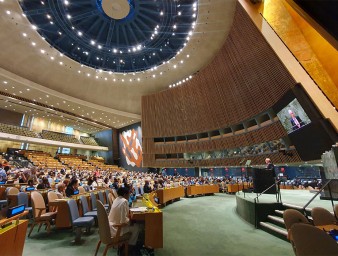Racism, discrimination are legacies of colonialism

Colonialism lives on today in the forms of racism, racial discrimination, xenophobia and intolerance, a UN report said, calling on States to dismantle the structures of racism and to promote human rights and sustainable development.
The report on the negative impact of the legacies of colonialism on the enjoyment of human rights said the weight of colonialism was still being carried today, most predominantly in the Global South, where political independence and decolonization have not been matched by sustainabledevelopment and the full enjoyment of human rights, including the right to development and socioeconomic rights.
There is an intrinsic link between colonialism and contemporary forms of racism, racial discrimination, xenophobia and intolerance faced by Africans, people of African descent, people of Asian descent and indigenous peoples. The report, presented to the 54th session of the Human Rights Council, is a summary of a panel discussion held in September 2022.
“While many former colonies have gained independence since the establishment of the United Nations, the process of decolonization remains incomplete,” UN Deputy High Commissioner for Human Rights Nada Al-Nashif told the panel.
Al-Nashif underlined that it was only with strong political leadership, honest dialogue and comprehensive responses that the long-lasting impact of the legacies of colonialism and its links to contemporary forms of racism and racial discrimination could be addressed.
“No State has comprehensively accounted for the past or the ongoing consequences of systemic racism, including the socioeconomic and political marginalization that shapes the lives of people of African descent in some countries,” she said.
She added that addressing the legacies of colonialism could contribute to overcoming inequalities within and among States and the sustainable development challenges of the twenty-first century.
Economic decolonization
Verene Shepherd, chair of the Committee on the Elimination of Racial Discrimination, said political independence and decolonization efforts had not meant the end of the evil of colonialism.
“Decolonization gave ex-colonies freedom of action but seldom the opportunity to exploit it to full advantage because economic decolonization, especially in the Global South, has not always been accompanied by political decolonization.” Shepherd added that the development that was expected to accompany independence did not materialize for many former colonial countries.
Environmental degradation, economic underdevelopment, racial profiling, systemic racism, and poor social infrastructure manifested in unequal access to health care, education and social justice were among the effects of colonialism, she added.
Shepherd cited the Durban Declaration and Programme of Action as a milestone in articulating the harms of colonialism, both historically and in the present. The Declaration recognizes that colonialism has led to racism, racial discrimination, xenophobia and related intolerance, and that Africans and people of African descent, and people of Asian descent and indigenous peoples were victims of colonialism and continue to be victims of its consequences.
While these injustices had long been acknowledged, they had not been addressed, she said. Shepherd called upon former colonial powers to own up to the wrongs of the past and to engage in a reparatory justice conversation with former colonies.
Race and human rights
E. Tendayi Achiume, then Special Rapporteur on contemporary forms of racism, racial discrimination, xenophobia and related intolerance, said that some of the most entrenched forms of systemic racism are the result of continuing legacies of slavery and colonialism.
“At least one legacy of colonialism is a world where race and ethnicity determine, for many people, whether or not they enjoy fundamental human rights,” she said.
Achiume said the legacies of colonialism continue to shape the global economy, and that the modes of extraction, production and consumption were at the heart of the ecological crisis.
“There can be no real way out of the most pressing global crises without meaningfully addressing the legacies of colonialism. The responsibility for taking action for a just future lay especially with those nations that, in the past and the present, had benefited from colonialism”.
For his part, José Francisco Calí Tzay, Special Rapporteur on the rights of Indigenous Peoples, said the right to self-determination of indigenous peoples must be recognized. It was central to redressing the historical and systematic violations of indigenous peoples’ rights.
Calí Tzay added that the negative impact of colonialism on indigenous peoples had resulted in systemic racism, poverty, economic inequity, violence, overincarceration, poor health, dispossession of traditional lands and territories, criminalization of indigenous human rights defenders, loss of language and culture, and violence and discrimination against women and girls.
He urged States to implement the various rights established in the United Nations Declaration on the Rights of Indigenous Peoples.
Mihir Kanade, Chair of the Expert Mechanism on the Right to Development, pointed out that the right to development is one of the most important human rights emerging from the global South. Its recognition as a human right was the result of the concerted struggle by the peoples of the newly decolonized countries to overcome the legacies of colonialism.
Kanade said the right to development is one important way to address the negative impact of the legacies of colonialism. A legally-binding instrument would go a long way to operationalizing that right”.
Fabian Salvioli, the Special Rapporteur on the promotion of truth, justice, reparation and guarantees of non-recurrence, said “the quest for truth, justice and reparation for colonial injustices constituted a debt that could not be postponed”.
The colonial transfer of wealth and racial oppression had created a legacy of social, economic, cultural and political exclusion the effects of which had been felt for generations, and were still felt today Salvioli said.
He added that transitional justice mechanisms such as truth commissions, reparations programs, public apologies and measures to ensure remembrance and education, as well as guarantees of non-recurrence were essential to tackle the most deep-rooted causes of colonial violence.



